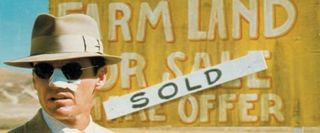The Best LA Detective Movie: Chinatown

With Gangster Squad coming to theaters this Friday, we've decided to take a look at some of our favorite Los Angeles detective stories, and what they tell us about the city they depict. Earlier, Katey Rich sang the praises of Robert Altman's 1973 noir The Long Goodbye, while Mack went to bat for L.A. Confidential. Today, Sean takes us to Chinatown for his choice of the quintessential California crime story.
Are we really debating the identity of the finest L.A. noir? Forget it, Jake. It’s Chinatown.
That’s not to slander the choices of my esteemed Cinema Blend colleagues – all fine films in their own right. But Roman Polanski’s intricate, precise period thriller, derived from a flawless Robert Towne screenplay, stands atop most lists of the greatest films of all time regardless of genre, and has to lead any discussion of the most rewarding noir exercises in Hollywood history.
Polanski’s so in sync with the expected noir ingredients than one almost assumes Chinatown was filmed in the early- to mid-1940s – when Bogart helped define the genre in taut Phillip Marlowe and Sam Spade cases – then stashed in a time capsule for the director to unseal in 1974. Sticking with tradition, we follow a textbook womanizing gumshoe named Jake Gittes (Jack Nicholson, drunk on self-confidence and at the top of his game) as he digs deeper and deeper into a sordid affair that involves the “usual suspects” of the genre: adultery, murder, blackmail, incest and water conservation.
Sorry, what was that last one? Water conservation?
Yes, the ultimate scheme powering Polanski’s masterpiece also ends up being the chief reason why Chinatown ranks as both a quintessential Los Angeles story and a vintage noir. How can a sun-dappled city nestled on the coast of the vast Pacific Ocean starve for water in its agricultural valley? How could something as universal as water be so valuable? “The middle of a drought and the water commissioner dies? Only in L.A.!”
Leaning heavily on the desert community’s reliance on water, Chinatown answers these vital questions while avoiding the easy trappings of celebrity greed and superficial vanity that’s often a staple of the L.A. noir. Forget the film industry. Towne and Polanski trace a crucial local thread tied to Southern California’s geography, its citrus crop and the power wielded by corrupt men who’ve figured out how to control the city’s water. Even Gittes can’t believe how far up the chain of command the scandal he’s investigating goes. It’s an admittance that eventually breaks his spirit and tarnishes his already-damaged soul.
CINEMABLEND NEWSLETTER
Your Daily Blend of Entertainment News
Chinatown isn’t soul-crushing. Despite the human darkness and social depravity it willfully embraces, it exhilarates with its steely, take-no-prisoners performances, its seamless plotting and its gripping, delectable dialogue. I’d argue it’s one of the five best movies I’ve ever seen, and without question the best Los Angeles film noir the industry has to offer.
Chinatown is available for purchase at Amazon.

Sean O’Connell is a journalist and CinemaBlend’s Managing Editor. Having been with the site since 2011, Sean interviewed myriad directors, actors and producers, and created ReelBlend, which he proudly cohosts with Jake Hamilton and Kevin McCarthy. And he's the author of RELEASE THE SNYDER CUT, the Spider-Man history book WITH GREAT POWER, and an upcoming book about Bruce Willis.
Most Popular




